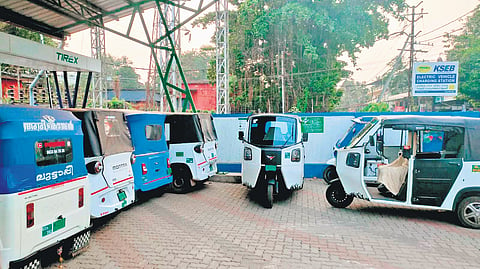

KOCHI: Electric autorickshaws are taking over the roads in the northern districts of Kerala while the south still lags far behind. As per the data available with the Parivahan in the first three months of 2024, around 20,000 electric vehicles were registered in the state. During the 2023-24 financial year, the state saw the registration of 4,068 electric autorickshaws, 61,787 two-wheelers and 9,712 light motor vehicles.
“There has been a significant rise in the number of e-autos in northern districts like Kozhikode and Malappuram while not much is happening in this sector towards the south,” said Ramanunni M, CEO and co-founder of chargeMOD. According to him, there are 3,500 e-autos in Kozhikode city and there are around 6,000 in the district while there are only 1,500 or so in Ernakulam.
“However, in tandem with the increase in the number of e-vehicles, a proportionate increase in the number of charging stations is not happening, especially in Malabar. If the charging stations are counted, the numbers are high in Ernakulam compared to Kozhikode and Malappuram. There are only 140 charging points in Kozhikode city which has the highest concentration of e-autos in the state,” Ramanunni said.
According to Mohammed Salim, secretary of E-auto CITU Sarovaram Section in Kozhikode, the numbers are increasing every year since the drivers are finding it more economical than traditional autorickshaws.
“But deficiency of charging stations is proving to be a problem,” he said.
“Taking into consideration this issue, our company which is the only public electric vehicle charge provider for EV autos in Kerala, has decided to install 500 slow chargers and 100 fast chargers aiming to reinforce our presence in Kerala. This is in addition to the existing 1,500 charging stations in Kerala,” Ramanunni said.
Explaining more about the issue, Jithin S Nair, CEO of Vaan Moto, said, “Besides the deficiency of charging stations, another problem that e-auto drivers face is the time needed to charge their vehicles. At present, a single charging requires around four to five hours. And the range of the vehicles is very less too. The e-autos being brought out by the Kerala Automobiles Limited (KAL) has a range of around 100 km.”
“The need of the hour is fast chargers or a facility for battery exchange. This was something that we had taken up with the state government. More three-wheeler owners will take to EV if these facilities are made available,” Jithin said.
According to Salim, at present, the situation is such that squabbles between the two-wheeler riders and e-auto drivers have become a common affair in Kozhikode city. “The same is true in other places in the state too,” he adds.